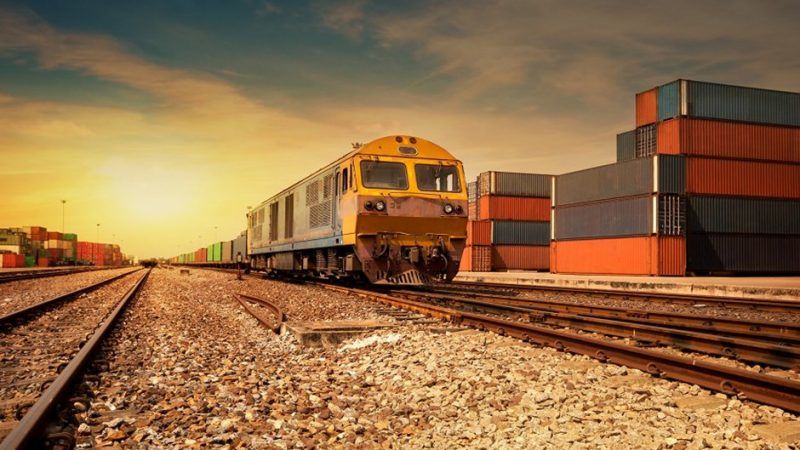
A Chinese train on the Belt and Road route [Twitter]
Comments Print
This article is part of our special report Astana: 20 years of thriving evolution.
Kazakhstan, the most impressive reformer in the Central Asian region, is set to benefit enormously from China’s Belt and Road initiative as an equal partner, Kate Mallinson of Chatham House said at an international conference marking the 20th anniversary of Astana, on 5 June.
Kate Mallinson is an associate fellow of the Chatham House Russia and Eurasia Programme.
Kazakhstan stands at the crossroads between East and West and between North and South, in an increasingly complex global environment. The country’s successful multi-vector foreign policy is enviable to many. Astana has been going through a sort of golden period, emerging as a neutral platform for the de-escalation and resolution of various conflicts and the country maintains positive relations with key powers including China, Russia, the EU and the US to name a few.
Astana will play a pivotal role in transforming this neutral platform into financial trade and transportation benefits for Kazakhstan as a whole. The country faces vast opportunities, from the various multilateral superplatforms – the EU, the Eurasian economic union and the Belt and Road Initiative. All three platform want to deepen their engagement with Kazakhstan. The Belt and Road initiative and the Eurasian economic union are examples of the emerging regional architecture of world politics today, and therefore it is very important they enforce positive development in Kazakhstan.
Although they geographically overlap, all three organisations differ substantially in history, motivation and design. The EU looks through the prism of good governance, democracy and strong commitment to human rights, while the Eurasian economic union focuses on modern economy, integration in a single market and free movement of capital, labour and goods and a unified legal basis. The Belt and Road initiative is driven by China to export domestic overcapacity and strengthen regional security. But there are some commonalities, including common security objectives, border strengthening, fighting transnational crime and targeting domestic and regional economic growth. This is where Kazakhstan fits in, because it shares these common objectives, and its involvement in all three platforms will assist its participation in free trade agreements in the WTO.
At the moment, unfortunately, the EU is staggering slightly under an increasing number of political risk issues, but bilateral connections between some of the EU countries and Kazakhstan, particularly the City of London and Astana, are currently very strong. Kazakhstan is a country with exceptional mineral pedigree and it’s a major investment destination for some of the largest European and American companies and financial institutions. These companies have pledged their interest in Kazakhstan for the next two to three decades.
China’s Belt and Road initiative has triggered a new European interest in Asia, and both Europe and China have a common interest in using this initiative to develop their domestic economies. The Eurasian economic union came into being at a difficult time because of Russian sanctions, while oil prices were plummeting. But Kazakhstan has masterfully navigated this challenges, as one of Russia’s most trusted and respected partners.
Astana can benefit from the difficulties currently playing out between the West and Russia by being a hub not only for trade but for diplomacy in the region. As times are getting complicated, how will Astana navigate Iran’s recently signed free trade agreement with the Eurasian economic union, in view of Kazakhstan’s extremely positive relations with America? The future importance of Asia for Kazakhstan is perhaps the clearest economic and political power shifting East in the 21st century, and Kazakhstan really stands to gain from this.
During the 19th Congress of the Chinese Communist Party President Xi Jinping successfully consolidated his power and enshrined the Belt and Road initiative into the Party Constitution, meaning that the core principles of the BRI will be reflected in China’s long term foreign policy, and will likely remain even after the President steps down. Kazakhstan is the most pivotal country for China’s land route, with this new Silk Road project, it is the buckle in this belt. Both Kazakhstan and China will benefit from cooperation in the Belt and Road initiative to a huge degree.
Digitalisation is incredibly important, it’s the so-called fourth industrial revolution, changing the traditional industry’s business model, and expected to contribute as much as 14% of global GDP by 2030, as much as $15 trillion in today’s value. And Asia is the world’s digital champion. And Kazakhstan is embracing digitalization. Within the Digital Kazakhstan 2020 concept, Chinese telecommunication companies will contribute to smart technologies for the Kazakh transport network. Kazakhstan will benefit from digitalising its transport system, it is very important for this country which is the size of Western Europe, and the changes are going to be immense. But the main question today is how these multilateral connections will help Kazakhstan, the most impressive reformer in the Central Asian region. And this is particularly acute as Uzbekistan emerges to challenge Kazakhstan’s hegemony in the region. The recent recovery in oil prices has had a very positive effect on Kazakhs’s economy and for economic growth. But it could slow the transition to a new growth model.
Kazakhstan needs foreign direct investment focused on exports and an increasing productivity to diversify and transform the economy. The country needs to embrace Chinese investments but also challenge the underlying assumption that large scale investments in infrastructure such as those at the heart of the Belt and Road initiative automatically promote economic development. The future development of Astana as a financial trade and innovation hub, built on solid institutional reform, will strengthen Kazakhstan in negotiating with China as an equal partner.
https://www.euractiv.com/section/central-asia/opinion/kazakhstan-will-benefit-enormously-from-belt-and-road-initiative/